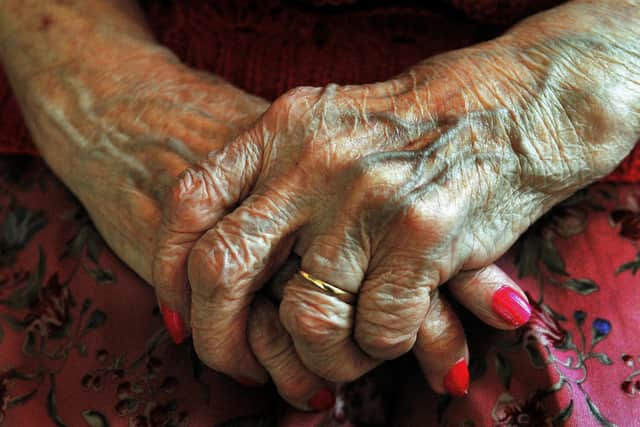Alzheimer's: One in three people who notice symptoms of dementia keep it to themselves
and live on Freeview channel 276
The study, for the Alzheimer's Society to mark Dementia Action Week, found people often suffer in silence or confuse early symptoms with old age.
The poll of 1,137 adults aged 18 to 85 was completed online by people living with diagnosed dementia, carers, people undiagnosed who suspect they have dementia and people who suspect a loved one has dementia.
Advertisement
Hide AdAdvertisement
Hide AdOf those surveyed, just 15% brought up the issue straight away and 11% said they still had not raised their concerns after first spotting symptoms.


Around a quarter (23%) waited more than six months before they spoke to a medical professional.
The Alzheimer's Society has launched a new campaign - It's not called getting old, it's called getting ill - to encourage people to seek support in getting a diagnosis.
The survey found that confusing dementia symptoms with normal ageing was the top reason people stayed silent (64%), followed by not wanting to worry their loved one (33%) and fears of how their relationships might change (16%).
Advertisement
Hide AdAdvertisement
Hide AdSome 44% said they were scared people would speak down to them or their loved one after they were diagnosed, or treat them like a child.
Mother-of-two Emma Ruscoe's husband Simon, from Solihull, was diagnosed with early onset dementia in 2019, aged 55.
She said: "It started in the car, he asked me a question, and then asked me the same thing moments later. He began losing objects, forgetting things and becoming withdrawn from everyone.
"I was terrified, the man I married over 30 years ago was slipping away and I didn't know why, or what to do.
Advertisement
Hide AdAdvertisement
Hide Ad"Simon knew something was wrong but was reluctant to talk because he was worried about how others would treat him - our friends thought I made it up and was experiencing menopause or stress. I begged him to see a doctor.
"The experience was frightening, stepping into the unknown. But we came out of the appointment knowing what the future held and how we would deal with it together.
"The diagnosis was a huge relief. It's difficult to accept - it took Simon nine months to say out loud that he had dementia.
"But you have to, there is no shame in seeking help. It allowed our family to plan for the future and get the support and advice we desperately needed, and I want other families to know that there is help out there."
Advertisement
Hide AdAdvertisement
Hide AdKate Lee, chief executive of the Alzheimer's Society, said: "We can't continue to avoid the 'd' word - we need to face dementia head on.
"This Dementia Action Week we want everyone to know there is support out there if you're confused about symptoms, or don't know how to have that first tricky conversation.
"As soon as you realise something is not right, come to Alzheimer's Society - you can use our symptoms checklist to help have that all-important first chat with your GP.
"At Alzheimer's Society we're dedicated to providing help and hope to everyone affected by dementia - nine in 10 people told us they benefited from getting a diagnosis, helping them access the treatments, support and advice a diagnosis unlocks."
Advertisement
Hide AdAdvertisement
Hide AdThe charity said getting an early diagnosis is crucial to help manage symptoms.
The breakthrough Alzheimer's drugs lecanemab and donanemab, which hit the headlines in recent weeks, are shown to work better in people who are diagnosed earlier.
The Alzheimer's Society used the firm Yonder to conduct the survey.